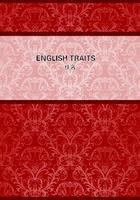
第32章
They do not wear their heart in their sleeve for daws to peck at. They have that phlegm or staidness, which it is a compliment to disturb. "Great men," said Aristotle, "are always of a nature originally melancholy." 'Tis the habit of a mind which attaches to abstractions with a passion which gives vast results. They dare to displease, they do not speak to expectation. They like the sayers of No, better than the sayers of Yes. Each of them has an opinion which he feels it becomes him to express all the more that it differs from yours. They are meditating opposition. This gravity is inseparable from minds of great resources.
There is an English hero superior to the French, the German, the Italian, or the Greek. When he is brought to the strife with fate, he sacrifices a richer material possession, and on more purely metaphysical grounds. He is there with his own consent, face to face with fortune, which he defies. On deliberate choice, and from grounds of character, he has elected his part to live and die for, and dies with grandeur. This race has added new elements to humanity, and has a deeper root in the world.
They have great range of scale, from ferocity to exquisite refinement. With larger scale, they have great retrieving power.
After running each tendency to an extreme, they try another tack with equal heat. More intellectual than other races, when they live with other races, they do not take their language, but bestow their own.
They subsidize other nations, and are not subsidized. They proselyte, and are not proselyted. They assimilate other races to themselves, and are not assimilated. The English did not calculate the conquest of the Indies. It fell to their character. So they administer in different parts of the world, the codes of every empire and race; in Canada, old French law; in the Mauritius, the Code Napoleon; in the West Indies, the edicts of the Spanish Cortes; in the East Indies, the Laws of Menu; in the Isle of Man, of the Scandinavian Thing; at the Cape of Good Hope, of the old Netherlands;and in the Ionian Islands, the Pandects of Justinian.
They are very conscious of their advantageous position in history. England is the lawgiver, the patron, the instructor, the ally. Compare the tone of the French and of the English press: the first querulous, captious, sensitive about English opinion; the English press is never timorous about French opinion, but arrogant and contemptuous.
They are testy and headstrong through an excess of will and bias; churlish as men sometimes please to be who do not forget a debt, who ask no favors, and who will do what they like with their own. With education and intercourse, these asperities wear off, and leave the good will pure. If anatomy is reformed according to national tendencies, I suppose, the spleen will hereafter be found in the Englishman, not found in the American, and differencing the one from the other. I anticipate another anatomical discovery, that this organ will be found to be cortical and caducous, that they are superficially morose, but at last tender-hearted, herein differing from Rome and the Latin nations. Nothing savage, nothing mean resides in the English heart. They are subject to panics of credulity and of rage, but the temper of the nation, however disturbed, settles itself soon and easily, as, in this temperate zone, the sky after whatever storms clears again, and serenity is its normal condition.
A saving stupidity masks and protects their perception as the curtain of the eagle's eye. Our swifter Americans, when they first deal with English, pronounce them stupid; but, later, do them justice as people who wear well, or hide their strength. To understand the power of performance that is in their finest wits, in the patient Newton, or in the versatile transcendent poets, or in the Dugdales, Gibbons, Hallams, Eldons, and Peels, one should see how English day-laborers hold out. High and low, they are of an unctuous texture. There is an adipocere in their constitution, as if they had oil also for their mental wheels, and could perform vast amounts of work without damaging themselves.
Even the scale of expense on which people live, and to which scholars and professional men conform, proves the tension of their muscle, when vast numbers are found who can each lift this enormous load. I might even add, their daily feasts argue a savage vigor of body.